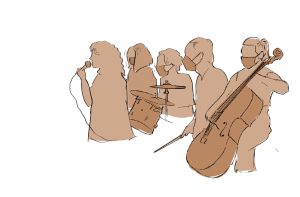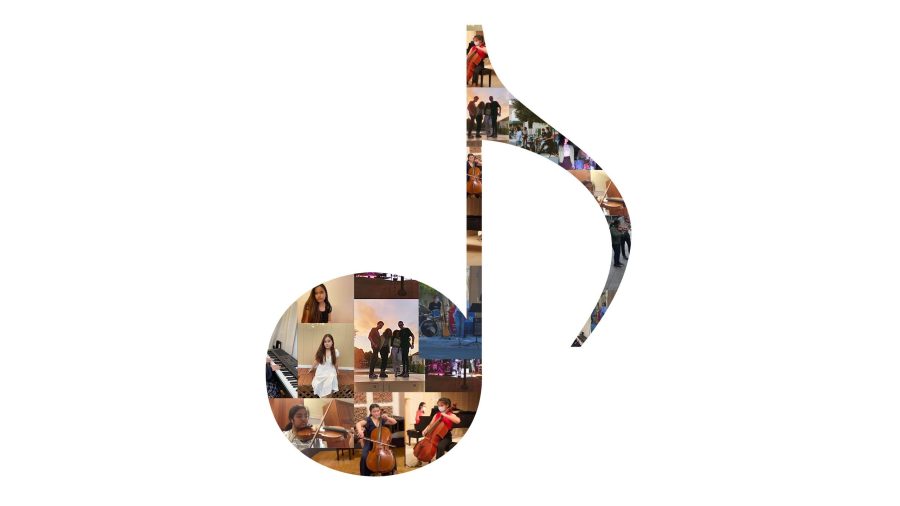What had once been concerts and live shows morphed into streaming platforms, virtual collaborations and Zoom as many musicians saw their lives change when the COVID-19 pandemic swept over the world. Over the past year, many student musicians also confronted the inability to collaborate in person with fellow musicians and resorted to practicing online or socially-distanced. But despite the difficulties that they faced, they also continued to find joy in making music.
From studio to room
When junior Elizabeth Wong set up her USB condenser mic, opened GarageBand and sat down on her bed, she settled in for a day-long process of recording vocals for her newest song. Like many musicians around the world, Wong found herself adjusting to the lockdown restrictions of COVID-19, with her room becoming her new recording studio.
A musician who writes and records her own music under the name Elizza, Wong said the global pandemic has limited her ability to record in the studio, where she would normally have guidance from her producer.
“I have to just keep recording until I personally feel like I recorded it well and found the best tape,” Wong said. “It’s a song that’s going to be out on Spotify, and you’re letting a lot of people listen to it. So it’s worth it to take the entire day and strive for the best vocal take.”
Wong said the pandemic has also limited her creative space to her house, forcing her to work more independently.
“It’s really different compared to when (I’m) in the studio because (I) get to talk face-to-face and watch my producer make my track,” Wong said. “I don’t really have someone to tell me (whether) I am singing right. So it’s just a lot more independent work and focus.”
Because she released her first EP in mid-February, Wong said she hopes to take some time off from working on any major projects and instead focus on developing her vocal technique. While she does not have any new releases planned, Wong said she is considering collaborating with other artists and making acoustic versions of her songs or creating music videos.
“I’m a really visual person and even when I’m writing a song, I can instantly think of a music video,” Wong said. “And I’ve never had the chance or the access to make one right now. So I’m hoping in the future I’ll come across the opportunity to do that.”
Finding a community
As quarantine restrictions fell into place last March, junior Annika Viswesh’s orchestra, the Palo Alto Chamber Orchestra, turned to virtual performances. Over the next few months, and relying on click tracks and other technology to synchronize everyone in the orchestra, Viswesh performed in community wide music projects featuring current orchestra members as well as alumni from all over the country.
“We made this giant concerto,” Viswesh said. “That was one of the fun things to record, not only because you’re recording with a click track, which means you have to hear yourself and make sure you’re on the beat with every single note, but also because you’re able to play with this entire community — everyone in this orchestra comes from all different walks of life. And yet here we are online playing something together.”
In addition to being a violinist with her orchestra, Viswesh is also the co-president of the Paly Chamber Musicians club. Viswesh said what draws her to chamber music most is the interaction between musicians it fosters — a vital component that has been limited to virtual interaction.
“It is so collaborative — everyone plays such an integral role in making the final performance sound as beautiful as it can be,” Viswesh said. “And I really miss that interpersonal connection. I really love hanging out with (my chamber music friends) — just knowing what their hobbies and their interests are outside of chamber music, and just talking and playing music.”
To seek out that sense of community, Viswesh said she has turned to performing for her parents during quarantine.
“It feels like I need to bring back that sense of community within my own space,” Viswesh said. “And having my family there when I play for them just feels like I have a community that’s right there in front of me — in addition to the virtual community of my friends and me in (our) orchestra.”
Viswesh said she has also come to appreciate how much musicians took for granted the spaces they previously performed in, when they could communicate emotions and transport the audience to a different realm with the help of body language.
“It’s just really difficult to imagine the performing arts field in general without having live concerts — without having people there to support you,” Viswesh said. “It’s much more tangible to see everyone’s emotions in person rather than in virtual, because when you’re typing through a chat window, you could be saying something, but it may never come across as what you really mean.”
Virtual collaboration
For indie alternative rock band Metro, closed city streets meant more than COVID-19 regulations — they meant performance opportunities.
“With the pandemic and everything, there were a couple of closed-down streets, and we’ve taken advantage of those,” Metro keyboardist Toni Loew said. “Everyone’s out there, eating outdoors … and it’s been super supportive.”
The Bay Area-based band, although currently split up across the country, is working on an album which will include their newest single, “Letters,” released in early February.
“I think it’s a really cool storytelling song, and it’s very clear these characters are having an interaction about their relationship — one has an idealized view of them together and the other one is realistic,” Metro drummer and senior Rein Vaska said. “I think that’s super emotional, and our music and production totally brings out that and highlights that story.”
For bassist and alumnus Joseph Cudahy, part of what makes Metro successful at writing music and playing together is the dynamic between band members. And while Cudahy said the ease of their relationships with each other has not changed online, playing together as a group in-person is something he misses.
“We have a very light-hearted kind of open relationship within our band — we’re all good friends,” Cudahy said. “And to a certain degree, that friendship, applied to us making music as a group together, is sort of lost — we don’t actually get to collaboratively make music in real time with each other.”
Despite collaborating mostly virtually, Vaska said even when the band practices in person while socially distanced, it feels different.
“There is a kind of musical creative energy in the room when you’re really there and everybody’s locked in,” Vaska said. “There are some moments when you can get into it — it’s just that we haven’t been able to have that full band kind of experience for a while.”
Practicing at home
Last October, sophomore Jennifer Mori experienced the challenges of planning a virtual assembly. Mori is an associate regional director at the non-profit Back to BACH and was planning this assembly to introduce elementary school students to classical music. But she said it didn’t feel the same as an in-person assembly.
“It was a new experience because we were trying to promote classical music when it’s on Zoom,” Mori said. “You aren’t able to feel that magic of music coming out of a wooden box that has four strings attached to it.”
Beyond needing to organize outreach events virtually, Mori said the impact of going virtual in everything music-related — from chamber music and orchestra rehearsals to private lessons and cello competitions — has made her work harder to stay motivated to practice.
“Music, for me at least, has become more of an independent thing,” Mori said. “You’re constantly (practicing) by yourself, which, in a way, is a good thing, because then you learn more about what you’re lacking when you’re practicing. But it’s also kind of unmotivated me to practice because it’s always on my own.”
Though virtual activities have sometimes made Mori less motivated to practice, she said she has also discovered a new side to music and collaboration that she looks forward to, one that lockdown restrictions helped make possible.
“My brother plays violin, and pre-COVID we wouldn’t be able to (play many duets together) because our schedules would often conflict with each other,” Mori said. “And I just never realized that, so close to me, there’s someone that I could always play with.”
Despite it not being the best-case scenario, Mori said she sees value in putting on virtual performances during the pandemic, such as the ones Back to BACH gives to schools through assemblies.
“It was almost humbling in a way,” Mori said. “I realized that this is the only way that some people are ever going to hear classical music — not ever live.”


